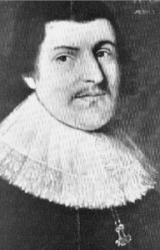Planning worship?
Check out our sister site, ZeteoSearch.org,
for 20+ additional resources related to your search.
- |
User Links
Search Results
The Praise of the Fathers
Appears in 5 hymnals First Line: Let us now praise famous men Scripture: Sirach 44:1-15 Used With Tune: [Let us now praise famous men]
The Praise of the Fathers
[Let us now praise famous men]
Appears in 21 hymnals Composer and/or Arranger: H. Lawes, c. 1595-1662 Tune Key: B Flat Major Incipit: 53215 65443 55456 Used With Text: The Praise of the Fathers
[Let us now praise famous men]
[Let us now praise famous men] (Williams)
Appears in 2 hymnals Composer and/or Arranger: Ralph Vaughan Williams, 1872-1958 Tune Key: C Major Incipit: 12356 53235 61765 Used With Text: Let Us Now Praise Famous Men
[Let us now praise famous men] (Williams)
[Let us now praise famous men]
Appears in 41 hymnals Composer and/or Arranger: H. Lawes Tune Key: B Flat Major Incipit: 53211 76544 3 Used With Text: SONG OF THE FATHERS
[Let us now praise famous men]
Let Us Now Praise Famous Men
Hymnal: The Hymn Book of the Anglican Church of Canada and the United Church of Canada #533 (1971) Tune Title: [Let us now praise famous men] (Williams)
Let Us Now Praise Famous Men
Let us now praise famous men
Hymnal: The Church Anthem Book #51 (1933) Languages: English Tune Title: [Let us now praise famous men]
Let us now praise famous men
The Praise of the Fathers
Hymnal: The Book of Common Praise #C141 (1939) First Line: Let us now praise famous men Scripture: Sirach 44:1-15 Tune Title: [Let us now praise famous men]
The Praise of the Fathers
Ralph Vaughan Williams

1872 - 1958 Person Name: Ralph Vaughan Williams, 1872-1958 Composer of "[Let us now praise famous men] (Williams)" in The Hymn Book of the Anglican Church of Canada and the United Church of Canada Through his composing, conducting, collecting, editing, and teaching, Ralph Vaughan Williams (b. Down Ampney, Gloucestershire, England, October 12, 1872; d. Westminster, London, England, August 26, 1958) became the chief figure in the realm of English music and church music in the first half of the twentieth century. His education included instruction at the Royal College of Music in London and Trinity College, Cambridge, as well as additional studies in Berlin and Paris. During World War I he served in the army medical corps in France. Vaughan Williams taught music at the Royal College of Music (1920-1940), conducted the Bach Choir in London (1920-1927), and directed the Leith Hill Music Festival in Dorking (1905-1953). A major influence in his life was the English folk song. A knowledgeable collector of folk songs, he was also a member of the Folksong Society and a supporter of the English Folk Dance Society. Vaughan Williams wrote various articles and books, including National Music (1935), and composed numerous arrangements of folk songs; many of his compositions show the impact of folk rhythms and melodic modes. His original compositions cover nearly all musical genres, from orchestral symphonies and concertos to choral works, from songs to operas, and from chamber music to music for films. Vaughan Williams's church music includes anthems; choral-orchestral works, such as Magnificat (1932), Dona Nobis Pacem (1936), and Hodie (1953); and hymn tune settings for organ. But most important to the history of hymnody, he was music editor of the most influential British hymnal at the beginning of the twentieth century, The English Hymnal (1906), and coeditor (with Martin Shaw) of Songs of Praise (1925, 1931) and the Oxford Book of Carols (1928).
Bert Polman
Ralph Vaughan Williams
Henry Lawes

1596 - 1662 Person Name: H. Lawes Composer (from) of "[Let us now praise famous men]" in The Hymnary of the United Church of Canada Born: January 5, 1596, Dinton, Wiltshire, England.
Died: October 21, 1662, London, England.
Buried: In the cloisters of Westminster Abbey, London, England.
Lawes, tutor to the daughters of the Earl of Bridgewater, is best known as a composer. He became a Gentleman of the Chapel Royal in 1626, and a member of the "King’s Musick" in 1631. He wrote over 400 vocal pieces, as well as anthems and instrumental compositions. His works include:
Choice Psalmes Put into Musick for Three Voices, 1648
Ayres and Dialogues (London: 1653)
Sources:
Frost, p. 680
Hughes, pp. 467-68
Nutter, p. 460
Stulken, p. 292
--www.hymntime.com/tch
Henry Lawes


 My Starred Hymns
My Starred Hymns

